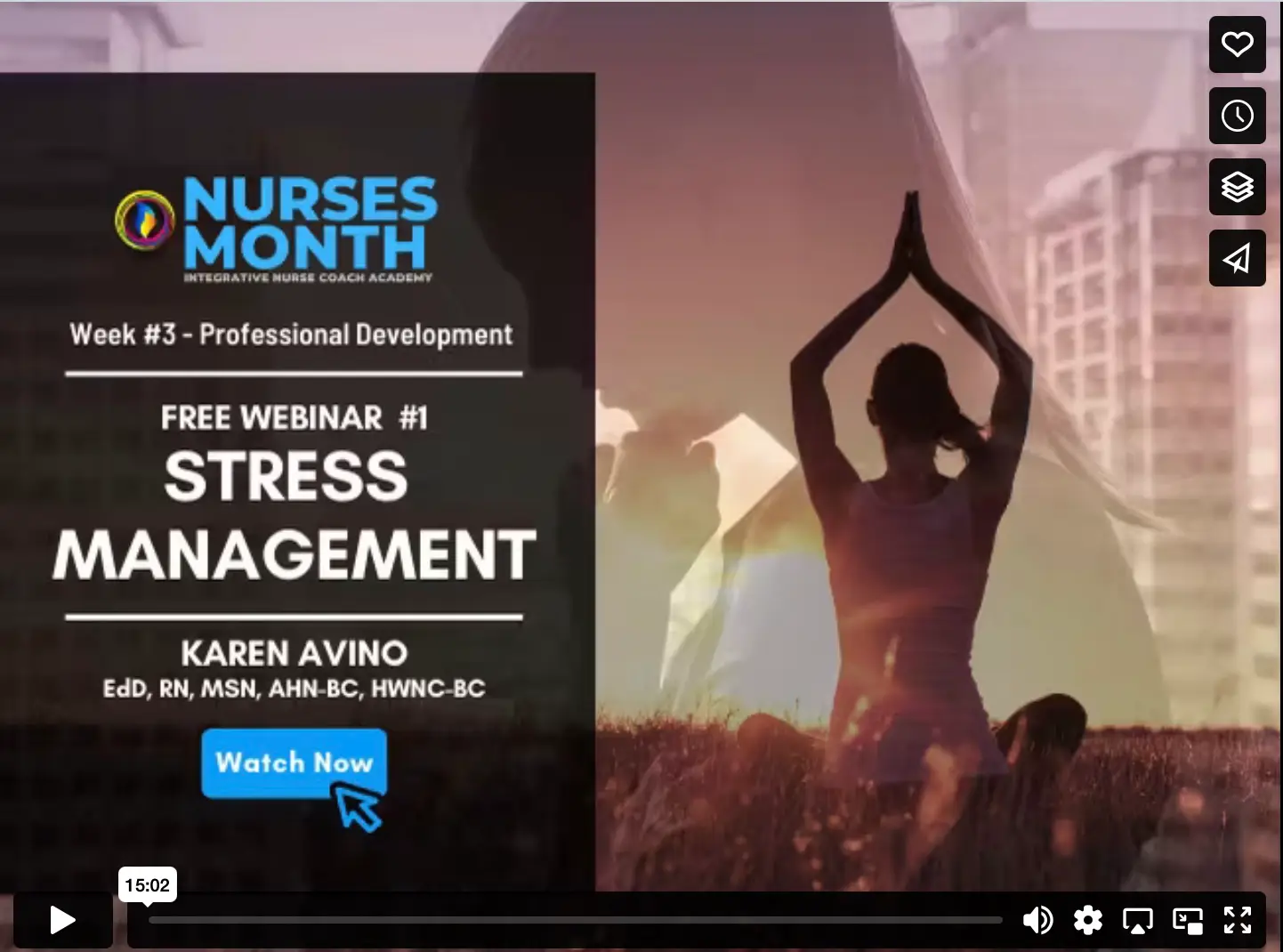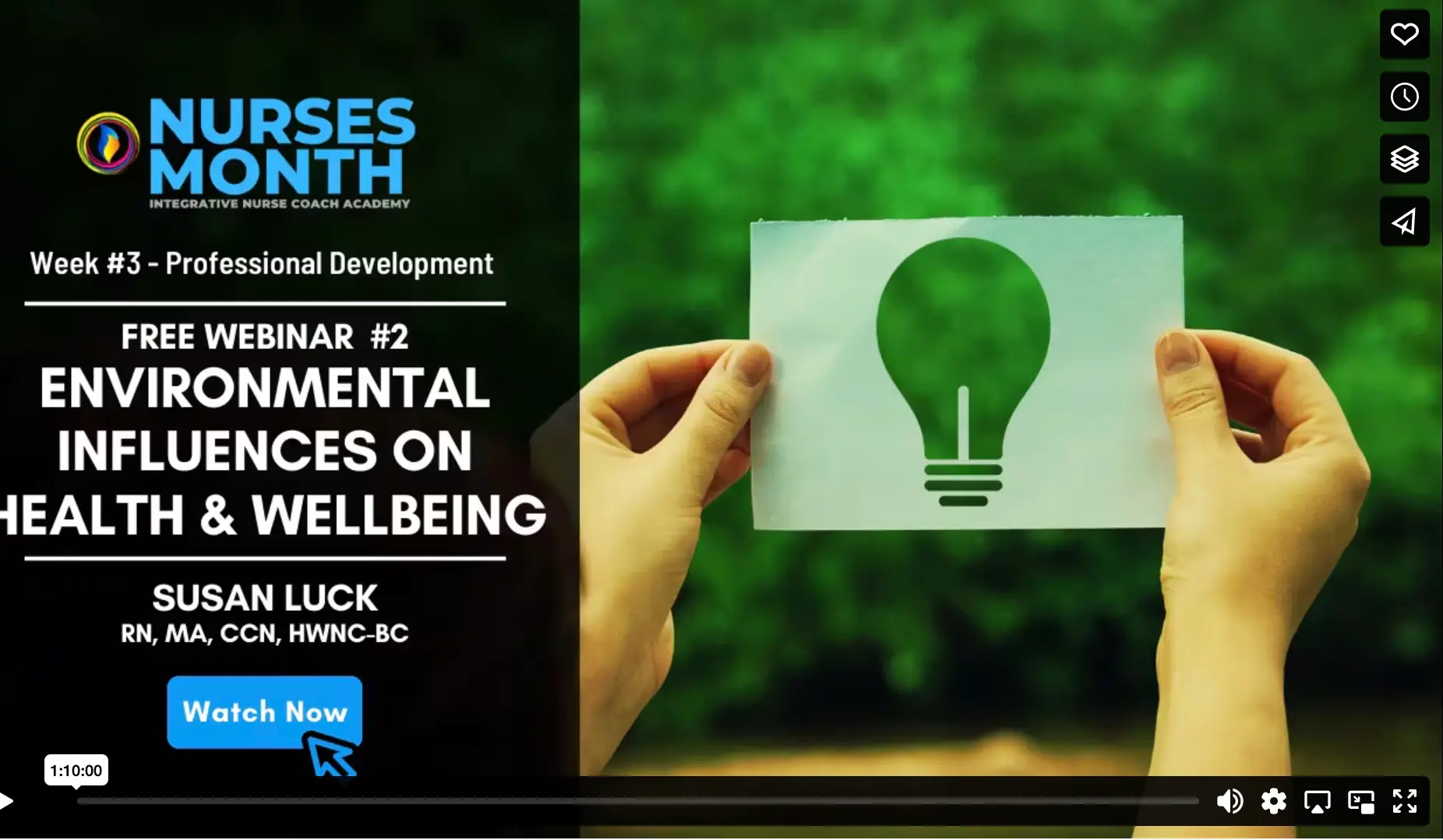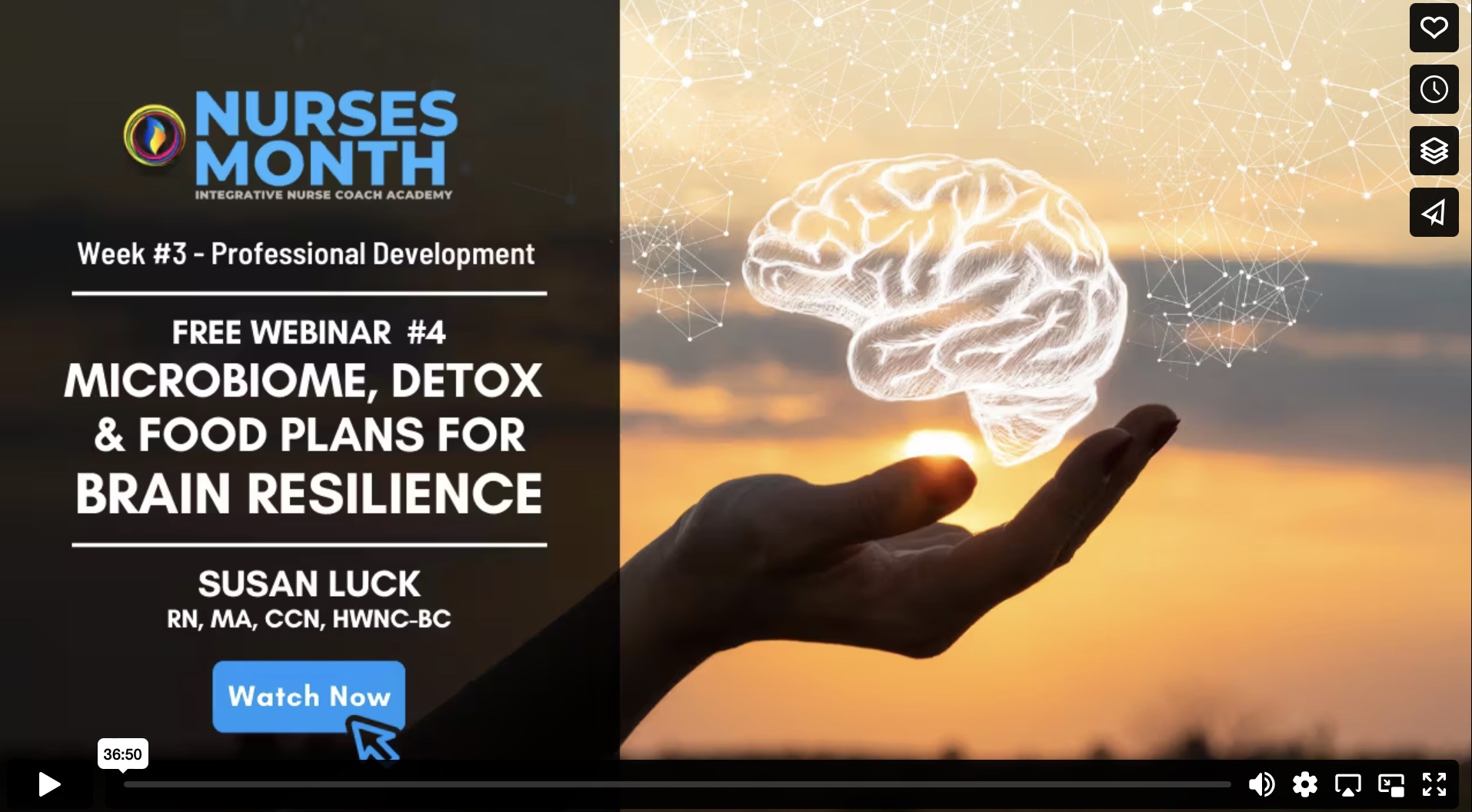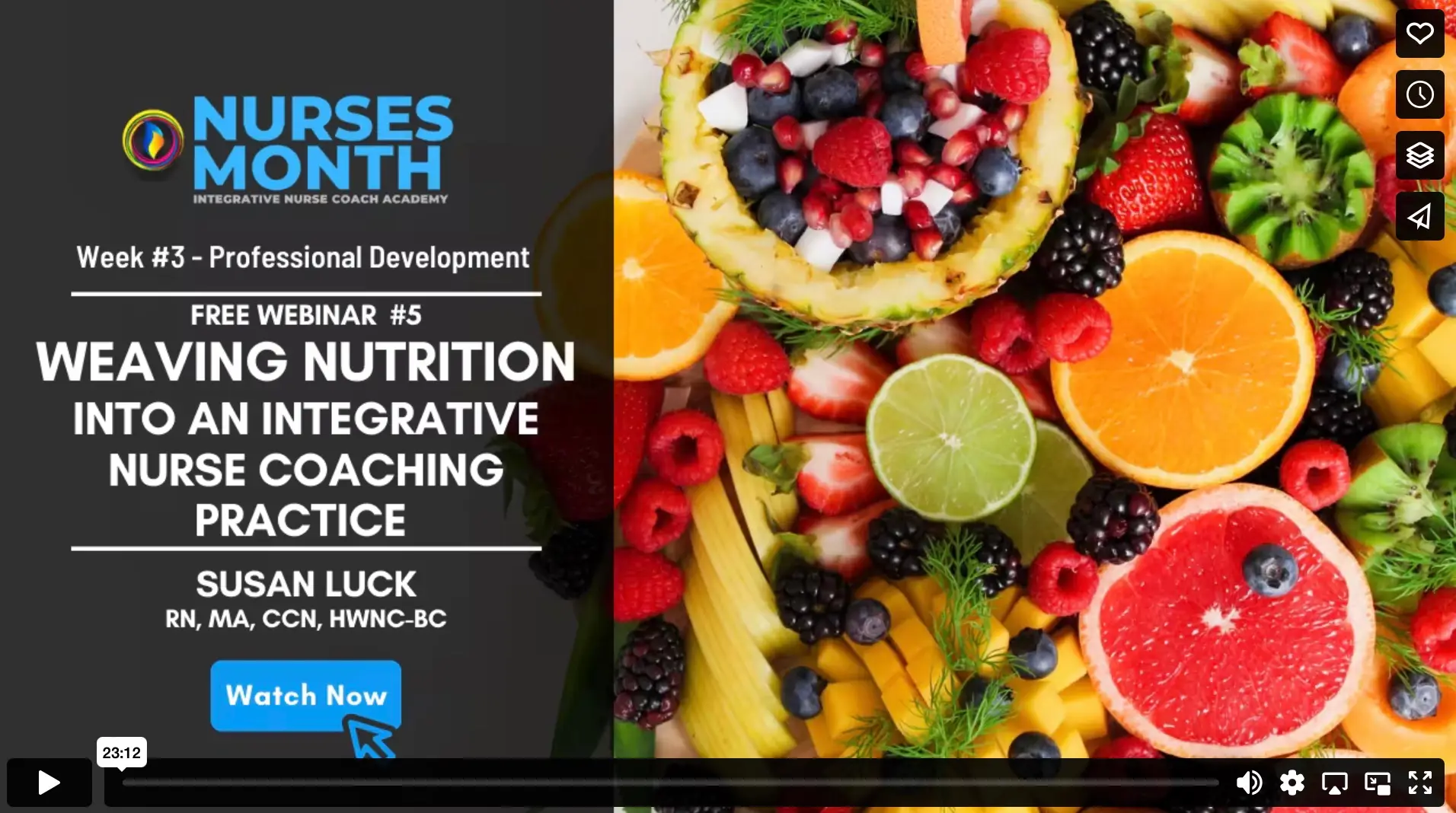Nurses are an essential part of our national healthcare system. They come in all shapes and sizes and work in various settings. Whether it be in the emergency department, schools, routine daily care, and much more, they make vital contributions that positively impact the lives, health, and wellbeing of our communities. Nurses make a difference!
Recently we shared a great collection of episodes of our Integrative Nurse Coaches in ACTION! Podcast, highlighting unique voices in nursing. We’re excited to share more professional development resources this week, starting with our webinars. Let’s get started!
#1. Stress Management with Karen Avino, EdD, RN, MSN, AHN-BC, HWNC-BC
Stress is meant to protect the body, but it can cause more damage than good when it reaches extreme levels. Too much stress causes the body to fall out of balance, which can be detrimental to immune system function, the digestive system, reproductive system, growth processes, behaviors, and more.
It is crucial to be cognizant of your body’s stress levels and take the necessary steps to regulate them and return to a “normal” level. Positive thoughts increase the hormone DHA, which helps increase mental clarity, enhance performance, strengthen your sense of resilience, and improve heart rate variability. Equilibrium can be achieved when the heart, mind, and emotions operate on the same level. Stress can hinder this equilibrium (even if it is good stress). Every human reacts differently to stress, and it is essential to know your body’s reactivity to stress.
When you feel overwhelmed, you can take certain steps or precautions, including scaling back activities, planning, reaching out to friends, family, or even colleagues and asking for help, getting adequate sleep, and engaging in self-care activities whenever possible.
Check out our webinar led by Karen Avino by clicking the image above and learning more about stress and how to manage it best!
#2. Environmental Influences on Health & Wellbeing with Susan Luck, RN, MA, CCN, HWNC-BC
Susan Luck leads an engaging webinar assessing environmental influences on health and wellness through a nurse coaching lens. Luck begins with nurse coaching and environmentalism objectives and includes an honorable mention of Florence Nightingale, the founder of modern nursing. As individuals working in public health, it is critical that we understand the impacts of the environment on our health, how we deliver healthcare and raise awareness of environmental health as it is rooted in integrity, honesty, respect for all other beings, and social justice.
Environmental and occupational interventions are more vital than ever. In the modern world we live in, it has become more evident than ever before in the contemporary world we live in just how much an unhealthy environment can have on human health. Globally, cancer is the second leading cause of death. Around 19% of cancers can be attributed to the environment (including work settings).
Aside from cancer, there are different connections between chronic and degenerative diseases and the environment. Environmental interventions are incredibly necessary; this may include minimizing exposure to carcinogens of any kind (in or out of the workplace), treating our environment with the same respect we treat patients with, and more.
The environment influences many aspects of our life, including our socio-cultural, biological, physical, and psychological health. There are over 85,000 known chemicals, some of which we understand their effects on the human body, and some effects are still unknown. People are exposed to environmental risk factors each and every day in workplaces, schools, and our communities via air pollution, water pollution, radiation, noise pollution, climate change, and more.
Susan Luck goes further into environmental factors that contribute to declining public health, common toxicities in our communities, modern research on the most toxic pollutants and their adverse effects, and the necessary steps to make real environmental change. Click the image above to listen to the complete webinar.
#3. Integral Perspectives and Change with Barbara Dossey, Ph.D., RN, AHN-BC, FAAN, HWNC-BC
Change can occur through multiple perspectives. Dossey begins with a well-known image to nurses and nurse coaches, one that outlines the following:
- The Subjective “I”- Means that change occurs within an individual internally
- The Objective “It”- Means that change occurs for an individual through external factors
- The Intersubjective “We”- Means change occurs through connections and communications with others or in a group interior perspective
- The Interobjective “Its”- Means that change occurs when an individual feels as though they fit and function within a system in which they actively participate
While many nurse coaches are fully aware of the objectives above, many fail to look internally and find where they themselves fit, how to find their role, positively challenge themselves, and change their perspectives to reflect positivity, self-worth, and a purpose.
Change is vital to success. Taking an integral perspective can positively impact one’s health, well-being, strength, healing, spirituality, and more. Nurses or nurse coaches must be actively taking care of themselves. In such an emotionally-demanding role, it is critical to balance work and personal life, engage in things that make you happy and peaceful and heal from past traumas. You cannot take care of others to the best of your ability if you are not taking care of yourself. Raise your positivity, engage in mindfulness, reduce your digital footprint, increase cognitive bandwidth, and re-discover your somatic senses.
Integral perspectives help support our healing to our fullest and obtain the highest level of overall wellness. It requires us to look internally for wisdom sources, engage in self-reflection, and carry out self-care acts.
#4. MicroBiome, Detoxification, and Food Plans for Brain Resilience with Susan Luck, RN, MA, CCN, HWNC-BC
It may not be common knowledge that our microbiome is considered an organ. Our microbiomes are affected by our environment, the things we eat or ingest, our immune system, and more. The microbiota within our body affects our psychological health, body functions, digestive systems, reproductive systems, and nearly everything else within our body.
Luck dives into the importance of detoxification and minimizing exogenous toxic exposure that can negatively affect our microbiomes and how we should counteract it. Individuals under higher stress levels or who follow a poor diet are more likely to have an unhealthy microbiome and may benefit from a “detox.”
Following a poor diet can also have detrimental effects on one’s psychological well-being and brain function. The first way that diet affects your brain is through inflammation. Diet can raise inflammation (like using artificial sweeteners) or decrease levels of inflammation (like switching to a green tea over a highly-caffeinated, high in aspartame diet soda). Higher or lower levels of inflammation can influence brain functionality.
Three science-supported diet plans are beneficial to brain health- ketogenic, Mediterranean, and paleo. Susan Luck gives a broad overview of each in the webinar above. Each has unique brain benefits, and one may better suit your lifestyle over another.
#5. Weaving Nutrition into an Integrative Nurse Coaching Practice with Susan Luck, RN, MA, CCN, HWNC-BC
In this webinar, Susan Luck returns to give an overview of how nutrition fits into the integrative nurse coach model. Nurse coaching is an energy-based model, and food plays a significant role in this model. She discusses nurse coaching strategies pertaining to nutrition, lifestyle, behaviors, choices, and initiating change in the lives of ourselves, our clients, and entire communities.
Human beings are constantly interacting electrically internally (with our bodies) and externally (with our environment). Our cell membrane is at the center of all interactions, and it stores all sources of energy for internal and external communications.
Sleep is often overlooked when it comes to nutrition. Sleep disturbances impact our food choices. Achieving a balance between these two elements is vital for improving one’s overall well-being. Avoid distractions, and make mindful choices regarding food choices, sleep patterns, and day-to-day activities (both in our work and personal lives). Be present and look deeper into the choices you make and if they will help you as an individual reach your personal goals. This will influence your nurse coaching practice, and you can become a model for your clients or patients.
When discussing nutrition, it is important to take into account our modern world, genetics, environmental influences, and also epigenetic effects that are influencers. Make sure you are looking at the “entire picture” when analyzing a client’s nutrition and making suggestions for implementing positive change.
Upcoming Programs for Nurses
We have several programs available exclusively for nurses and nurse coaches. Learn from experienced Holistic & Integrative Nurse Leaders in our new Specialty Programs.
- The Business of Nurse Coaching
- Becoming a Cannabis Nurse: CannyNurse™ Certificate Program
- Stillness Practice: A Mindfulness Approach for Nursing in the Present
- Re-Imagining the End of Life: Self-Development & Reflective Practices for Nurses
- Functional Medicine for Nurses™ – A Root Cause Approach to Health & Healing
- And, of course, our Integrative Nurse Coach® Certificate Program
More Specialty Programs for Nurses Coming Soon! Make sure you are subscribed to our email list to stay up-to-date!
- Carlie Carterhttps://inursecoach.com/author/carlie-carter/
- Carlie Carterhttps://inursecoach.com/author/carlie-carter/
- Carlie Carterhttps://inursecoach.com/author/carlie-carter/
- Carlie Carterhttps://inursecoach.com/author/carlie-carter/










